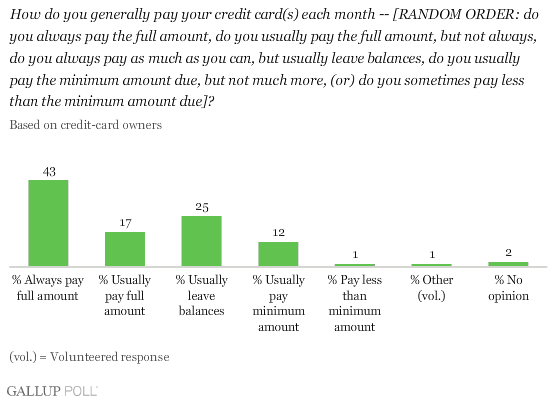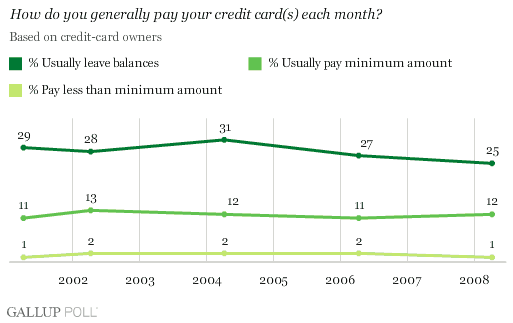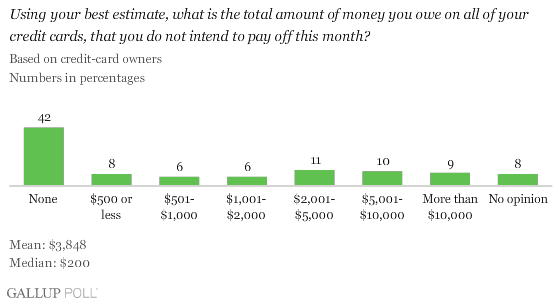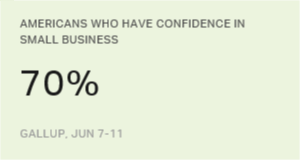PRINCETON, NJ -- Forty-three percent of American credit-card holders say they always pay off the full balance on their cards each month and another 17% say they usually pay their full balances each month. On the other hand, 25% acknowledge that they usually leave a balance and 12% say they usually pay only the minimum amount due each month (1% pay less than the minimum).

Consumer Credit-Card Use
Last Friday, the Federal Reserve Board reported that total consumer credit rose $8.9 billion in April and reached a total of $2.56 trillion. While total consumer borrowing increased at a 4.2% annual rate in April, this was down from March's 6.2% rate. April's revolving debt, including credit cards, showed the smallest increase since May 2005, as it grew by only $300 million.
Even as the Fed reported that consumers used their credit cards less during April, ║┌┴¤═°'s April survey of consumer credit-card use showed the percentage of consumers saying they usually leave a balance or make the minimum payment on their credit cards has declined over the past several years. In April 2001, 41% of credit-card owners said they usually left a credit-card balance at the end of the month, or made the minimum monthly payment or less. This percentage increased to a high of 45% in April 2004 before declining to 40% in 2006 and to 38% in 2008.

Consumers' Card Balances
║┌┴¤═°'s survey of credit-card use also shows that American credit-card holders have about four credit cards on average. Many Americans also maintain fairly high credit-card balances. Overall, credit-card holders reported an average balance of $3,848 in April 2008 (though the median, or middle value, is just $200). More importantly, 30% say they have a balance of more than $2,000, with 19% reporting a balance of more than $5,000 and 9% more than $10,000.

Commentary
A reduction in credit use tends to have the negative effect of reducing consumer spending and that, in turn, tends to slow economic growth. On the other hand, when consumers are facing as many financial challenges as they are today, reduced credit-card use provides some reassurance that consumers are making the spending adjustments they need to make and will be able to continue paying their credit-card bills in the months ahead.
Of much greater concern is another report the Fed released late last week, showing that during the first quarter of this year, household net worth decreased by the most it has fallen at any time in more than five years. The Fed's Flow of Funds Report also showed that real estate-related assets dropped by the most since records began in 1952. Assuming consumer wealth has an impact on how consumers feel about taking on additional debt as well as doing additional spending, the first quarter drop in household net worth suggests that credit-card use may decline further as 2008 unfolds.
Survey Methods
Results are based on telephone interviews with 1,021 national adults, aged 18 and older, conducted April 6-9, 2008. For results based on the total sample of national adults, one can say with 95% confidence that the maximum margin of sampling error is ┬▒3 percentage points.
For results based on the sample of 834 credit-card owners, the maximum margin of sampling error is ┬▒4 percentage points.
Interviews are conducted with respondents on land-line telephones (for respondents with a land-line telephone) and cellular phones (for respondents who are cell-phone only).
In addition to sampling error, question wording and practical difficulties in conducting surveys can introduce error or bias into the findings of public opinion polls.
To provide feedback or suggestions about how to improve ║┌┴¤═°.com, please e-mail feedback@gallup.com.
